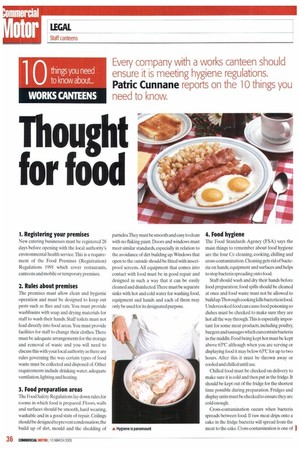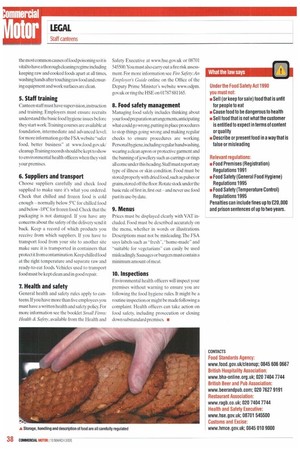Thought for food
Page 36

Page 38

If you've noticed an error in this article please click here to report it so we can fix it.
1. Registering your premises
New catering businesses must be registered 28 days before opening with the local authority's environmental health service. This is a requirement of the Food Premises (Registration) Regulations 1991 which cover restaurants, canteens and mobile or temporary premises.
2. Rules about premises
The premises must allow clean and hygienic operation and must be designed to keep out pests such as flies and rats. You must provide washbasins with soap and drying materials for staff to wash their hands. Staff toilets must not lead directly into food areas. You must provide facilities for staff to change their clothes. There must be adequate arrangements for the storage and removal of waste and you will need to discuss this with your local authority as there are rules governing the way certain types of food waste must be collected and disposed of Other requirements include drinking water, adequate ventilation, lighting and heating.
3. Food preparation areas
The Food Safety Regulations lay down rules for rooms in which food is prepared. Floors, walls and surfaces should be smooth, hard wearing, washable and in a good state of repair. Ceilings should be designed to prevent condensation, the build up of dirt, mould and the shedding of particles.They must be smooth and easy to clean with no flaking paint. Doors and windows must meet similar standards, especially in relation to the avoidance of dirt building up. Windows that open to the outside should be fitted with insectproof screens. All equipment that comes into contact with food must be in good repair and designed in such a way that it can be easily cleaned and disinfected.There must be separate sinks with hot and cold water for washing food. equipment and hands and each of them may only be used for its designated purpose.
4. Food hygiene
The Food Standards Agency (FSA) says the main things to remember about food hygiene are the four Cs: cleaning, cooking, chilling and cross-contamination. Cleaning gets rid of bacteria on hands, equipment and surfaces and helps to stop bacteria spreading onto food.
Staff should wash and dry their hands before food preparation; food spills should be cleaned at once and food waste must not be allowed to build up.Thorough cooking kills bacteria in food. Undercooked food can cause food poisoning so dishes must be checked to make sure they are hot all the way through.This is especially important for some meat products, including poultry, burgers and sausages which can contain bacte ria in the middle. Food being kept hot must be kept above 63°C although when you are serving or displaying food it may below 63°C for up to two hours.. After this it must be thrown away or cooled and chilled until use.
Chilled food must be checked on delivery to make sure it is cold and then put in the fridge. It should be kept out of the fridge for the shortest time possible during preparation. Fridges and display units must be checked to ensure they are cold enough.
Cross-contamination occurs when bacteria spreads between food. If raw meat drips onto a cake in the fridge bacteria will spread from the meat to the cake. Cross-contamination is one of I the most common causes of food poisoning so it is vital to have a thorough cleaning regime including keeping raw and cooked foods apart at all times, washing hands after touching raw food and ensuring equipment and work surfaces are clean.
5. Staff training
Canteen staff must have supervision,instruction and training. Employers must ensure recruits understand the basic food hygiene issues before they start work .Training courses are available at foundation, intermediate and advanced level; for more information go the FSA website "safer food, better business" at www,food.gov.uk/ cleanup.Training records should be kept to show to environmental health officers when they visit your premises.
6. Suppliers and transport
Choose suppliers carefully and check food supplied to make sure it's what you ordered. Check that chilled and frozen food is cold enough normally below 5°C for chilled food and below -18°C for frozen food. Check that the packaging is not damaged. If you have any concerns about the safety of the delivery send it back. Keep a record of which products you receive from which suppliers. If you have to transport food from your site to another site make sure it is transported in containers that protect it from contamination. Keep chilled food at the right temperature and separate raw and ready-to-eat foods. Vehicles used to transport food must be kept clean and in good repair.
7. Health and safety
General health and safety rules apply to canteens. If you have more than five employees you must have a written health and safety policy. For more information see the booklet Small Firms: Health & Safety, available from the Health and Safety Executive at wmrw.hse.gov.uk or 08701 545500. You must also carry out a fire risk assessment For more information see Fire Safety:An Employer's Guide online on the Office of the Deputy Prime Minister's website www.odpm. gov.uk or ring the HSE on 01787 881165.
8. Food safety management
Managing food safely includes thinking about your food preparation arrangements,anticipating what could go wrong, putting in place procedures to stop things going wrong and making regular checks to ensure procedures are working. Personal hygiene, including regular handwashing, wearing a clean apron or protective garment and the banning of jewellery such as earrings or rings all come under this heading. Staff must report any type of illness or skin condition. Food must be stored properly with dried food,such as pulses or grains, stored off the floor. Rotate stock under the basic rule of first in, first out — and never use food past its use-by date.
9. Menus
Prices must be displayed clearly with VAT included. Food must be described accurately on the menu, whether in words or illustrations. Descriptions must not be misleading. The FSA says labels such as "fresh "home-made" and "suitable for vegetarians" can easily be used misleadingly. Sausages or burgers must contain a minimum amount of meat.
10. Inspections
Environmental health officers will inspect your premises without warning to ensure you are following the food hygiene rules. It might be a routine inspection or might be made following a complaint. Health officers can take action on food safety, including prosecution or closing down substandard premises. •










































































































































































































